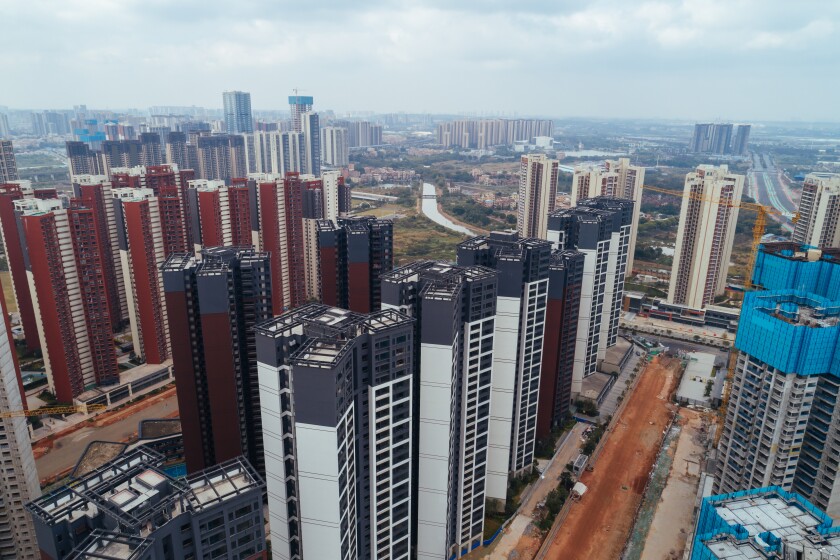China’s property debt crisis appears to be spiralling out of control. While there is no easy fix for the liquidity crunch facing the sector, there is growing urgency to restore investor confidence in the country’s credits.
The liquidity trouble for the property market has intensified this year, diluting the effect of several policy measures announced so far as more off-balance sheet debt at developers gets uncovered.
The outcome? More rating downgrades that further cut the access of developers to the capital markets, a complete loss in confidence in the sector, slumping bond prices, growing fears that even firms previously considered strong will soon be in trouble, and a host of auditor resignations.
If these issues were not enough, the spill-over of global volatility emanating from the triple whammy of Russian attacks on Ukraine, a spike in energy prices and rate volatility has sucked any leftover liquidity from the Asia bond market.
Asia’s primary dollar bond market has been all but shut in recent weeks. Some Chinese issuers — mostly state-backed — have managed to print deals, but only with support from their bookrunners or by using credit enhancements like standby letters of credit issued by local banks.
The situation is dire, especially as property companies have $5bn of maturities to meet just this month, with another $5bn of bonds coming due in April. The dollar bond market has long been a mainstay of liquidity for property borrowers.
Investors are rightly concerned, with many telling GlobalCapital Asia that the liquidity crunch has now turned systemic, with investors no longer able to assess developers simply by their credit profiles.
Bondholders are frustrated, given they are sitting on heavy mark-to-market losses and being made to swallow debt swaps as distressed funds outnumber real money buyers in the secondary market.
Such unprecedented times call for unprecedented measures. The Chinese authorities should make fixing the hidden debt problems at developers a priority — if only to prevent a similar situation again.
Solutions
Hidden debt, or off-balance sheet debt, is a practice whereby companies keep some assets and liabilities from being included in their balance sheets. This helps keep leverage ratios low, helping them access cheaper financing from lenders and investors. A lot of the off-balance sheet debt at developers is in the form of unreported privately placed bonds or undisclosed guarantees on wealth management products.
Some may argue that it would be impossible to eliminate hidden debt from the sector. That may be true, but if the government doesn’t tighten the screws now, the same bad debt may resurface as a pain for many others: like state-owned enterprises, Chinese lenders or asset management companies that are trying to rescue the property sector by injecting liquidity.
For instance, one of the big four asset managers, China Orient Asset Management is planning to raise Rmb10bn from a three year bond. The proceeds will be used to buy high quality projects and bad assets from developers.
Speaking at the 13th National People’s Congress this month, Chinese premier Li Keqiang unveiled plans to establish a financial stability fund for the sector. He also said the government will use market oriented and law-based ways to diffuse risks.
One possible way to fix the off-balance sheet problem could be to ensure auditors are rotated every few years. In the Mainland, state-owned enterprises switch auditors every five years; this can be extended to other companies as well to promote more transparency.
After all, auditors are gatekeepers for shareholders and best placed to detect early frauds. As a result, some onus should also be placed on them to make public any matters that impact the financial health, liquidity position or confidence of investors in companies.
In cases of resignations of auditors of listed entities, the exchanges can take charge too and disclose all the information provided by auditors to explain their exit. For instance, in some recent resignations, a disagreement over fees was cited as one of the reasons for the change in an auditor, but sources have told GlobalCapital Asia that is a commonly used excuse to avoid disclosing the real reason behind their resignations.
The practise should be tackled, again in a bid to bring more transparency to a sector under an incredible amount of pressure.
Some companies do tend to stay away from proactive auditors but if auditors remain placid, they will hurt investor interest, their own reputation in the long run and could become facilitators of a systemic risk.
The Hong Kong Stock Exchange currently puts out separate announcements around modified reports from firms. In Singapore too, companies share more information on which auditor has done the underlying work in situations where they have multiple or different auditors. Such transparent practices are needed for the China property sector.
Rating agencies can also play a bigger role by engaging more proactively with their clients on hidden debt disclosures. The more the market is informed, the better it will be at managing risks.
Admittedly, market players may have to let the current property crisis run its course. But a no-tolerance policy towards hidden debt and a push for more transparency and disclosures will be critical to avert another crisis.

